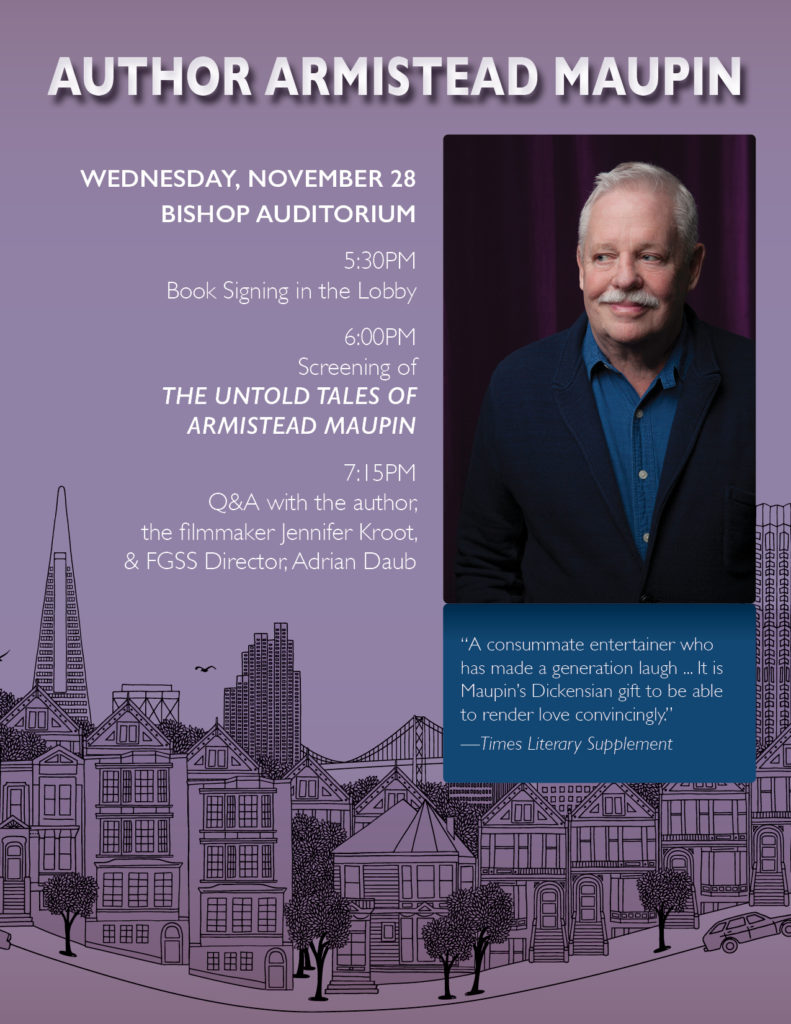A chance to meet the man who “invented San Francisco”: Armistead Maupin at Stanford on Wednesday, Nov. 28
Sunday, November 25th, 2018On Wednesday, Nov. 28, author Armistead Maupin will be visiting Stanford – first signing books in the Bishop Auditorium lobby at 5:30 and then joining us for a screening of The Untold Tales of Armistead Maupin. At 7:15 p.m., Stanford’s Prof. Adrian Daub will engage him in an onstage conversation with filmmaker Jennifer Kroot.
A few words from Adrian below (some of you might remember his lively presence during the Another Look discussion of J.R. Ackerley’s My Father and Myself):
 For an entire generation of Bay Area residents, the Tales of the City, which appeared in the San Francisco Chronicle in serialized form from 1976 to 1989, was appointment reading, but since then readers have largely encountered the Tales and their sequels in novel-form and in an HBO miniseries starring Laura Linney (and due to be revived next year). Which means, maybe he hasn’t been part of the fabric of their lives as much as he was for their elders. Nevertheless, they have lived in the world he created. Quentin Crisp once joked that in Tales, Maupin “invented San Francisco” — and the stories of various residents unknown, famous, and infamous indeed explained and dramatized tumultuous decades of San Francisco history as they were unfolding.
For an entire generation of Bay Area residents, the Tales of the City, which appeared in the San Francisco Chronicle in serialized form from 1976 to 1989, was appointment reading, but since then readers have largely encountered the Tales and their sequels in novel-form and in an HBO miniseries starring Laura Linney (and due to be revived next year). Which means, maybe he hasn’t been part of the fabric of their lives as much as he was for their elders. Nevertheless, they have lived in the world he created. Quentin Crisp once joked that in Tales, Maupin “invented San Francisco” — and the stories of various residents unknown, famous, and infamous indeed explained and dramatized tumultuous decades of San Francisco history as they were unfolding.
The Tales were also crucial in making LGBT culture mainstream — he was among the first novelists to feature a serious, fleshed out and sympathetic trans character, he was among the very first writers to tackle AIDS. But he never tackled them as issues, as challenges — they wove themselves into the Tales almost by necessity. The Tales are a spell he has woven around San Francisco for more than forty years, a spell that allowed the city to see itself for what it was, is, and could be. It therefore feels so appropriate that we get to host Armistead Maupin at Stanford on Nov. 28 — 40 years and a day after the murder of Harvey Milk and George Moscone. The forty years are about reflecting what that turbulent time meant, and how our own present would measure up before its fears and promises. And the day is about writing and thinking about the next step.






